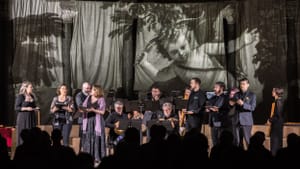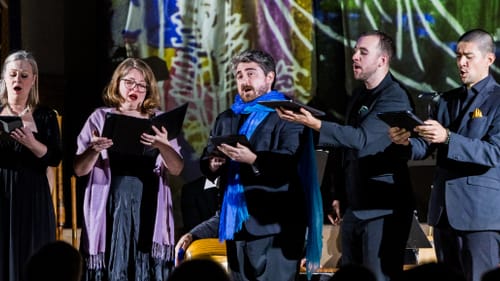Stay in the Loop
BSR publishes on a weekly schedule, with an email newsletter every Wednesday and Thursday morning. There’s no paywall, and subscribing is always free.
A musical tribute to the founder of Humanism
Piffaro and TENET present Triomphi: Petrarch’s Triumphs Expressed in Music of the Italian Renaissance

Many ensembles close a season with fireworks, but this year, Piffaro opened with its most expansive offering. Triomphi explored music gloriously swirling around the great Renaissance poet Francesco Petrarch (1304-1374), founder of Humanism. Subtitled Petrarch’s Triumphs Expressed in Music of the Italian Renaissance and created by Grant Herreid, the concert (itself a triumph) was impeccably played by Piffaro, ravishingly sung by TENET vocalists, and strikingly illuminated with projections by Camilla Tassi. A recording will be available to stream November 1-14, 2024.
The Petrarch work inspiring this concert is an autobiographical series of allegorical poems in terza rima, a complex Italian rhyme scheme. Triumphs (I triofoni) was inspired by the writer’s lifelong, unfulfilled love for the lady Laura. Like the poem, where the Poet (in a dream) meets powerful allegorical forces, the Piffaro concert was divided into six sections.
A poignant tale with fine projections
Seeking (and succeeding) “to express Petrarch’s poignant tale,” Herreid chose 28 works encompassing varied musical styles—madrigals, festival songs, and instrumentals, along with the generic music called arie per cantar (airs for singing) popular in the 16th century. Some works set Petrarch’s own writings, a concert highlight.
Throughout, music was illuminated by gorgeous large projections created by Italian designer and musician Tassi, a Florentine like Petrarch, and herself a singer. Tassi sourced scores of Renaissance paintings, illustrations, and drawings and used them to great effect, alternating colorful images with stark black-and-white drawings.
The Triumph of Love
The evening opened with a spritely instrumental prelude for three recorders, La Gamba in Basso e Soprano by Vincenzo Ruffo (1508-1587). Then, six TENET vocalists each embodied one of Petrarch’s “triumphs.” In the opening section (Triumph of Love), filled with amorous odes, Love/Cupid was sung by soprano Madeline Apple Healey. The section opened with all singers offering an a cappella setting of Petrarch’s text Nel tempo che rinnuova i miei sospiri (“In the season that renews my sighing”) from a 1561 book of madrigals by Giaches de Wert (1535-1596).
A concert highlight was the beautifully sung duet Coment peult avoir joye (“How can anyone be happy”) between the Poet (tenor James Reese, representing Petrarch) and Chastity/Laura (soprano Clara Rottsolk) by the great Josquin des Prez (c. 1450-1521) that held the audience spellbound. And Healey, accompanied by two lutes (Herreid and Daniel Swenberg), gave an elegant reading of Amor insegna no aver timore (“Love teaches one not to be timid”), filled with syncopated rhythms. Though arresting, the era’s abundance of love songs meant that works in this section outnumbered the others, and it felt slightly too long.
Chastity and Death
The next section, Triumph of Chastity, was filled with the longing (and complaints) of unfulfilled lovers. The women opened with a trio—Canzona delle Nimphe Fiesolane (“Song of the Lasses of Fiesole”)—an anonymous carnival song adapted by Herreid, with intricate harmonies over a spare flute and recorder accompaniment. The entire company ended this section with a stirring Canzona del Triompho della Pudicitia, underscored by persistent percussion.
The concert’s first half closed soberly with its third section, Triumph of Death. This doleful segment opened with the anonymous Carro della morte (“Chorus of the Dead”), all vocalists accompanied by a plaintive recorder/sackbut duo. Especially moving was Io son colei, an inexorable lament whose grim text (“I am she called relentless and fierce by you, deaf and blind people”) was rendered by mezzo-soprano Elisa Sutherland, her voice perfectly suited to Petrarch’s rich text. The section also featured the men singing the Dies irae from the requiem mass and closed with Mia benigna fortuna (“My kindly fate”) by Cipriano de Rore (1516-1565), as the Poet (Reese), buoyed by his fellow vocalists, channeled grief across the centuries.
Fame and Time
The concert’s second half opened with the fourth section, Triumph of Fame. After a lively instrumental sinfonia, Fame (tenor Jacob Perry) threw a vibrant blue scarf over his shoulder and took on a confident persona to sing a spirited frottola—L’huom terren caduco e frale (“Earthly man, weak and frail”)—boasting that Fame will triumph over place and time.

The fifth section, Triumph of Time, featured baritone Andrew Padgett in Il Tempo fugge (“Time, time flies”). Accompanied by a lute and a soulful theorbo, Padgett elegantly shaped this song (part dirge, part sarabande) about time’s relentless nature: “Today it comes, tomorrow it passes.” The section closed with Passan vostri triomphi (“Your grandeur passes”), a Petrarch text set by Orlando di Lasso (1532-1594) that tellingly reminded how “time dissolves your eloquence and the feats of your mind.”
Meeting the highest starry cloisters
Fittingly, the concert closed with Triumph of Eternity, as soprano Jolle Greenleaf (a major force in the early music scene) portrayed the Angel. Projections became overtly religious as she sang another di Lasso work, Pon fren’ al gran dolor (“Rein in the grief”), whose eloquent Petrarch text attests to the eternal nature of his love. And for the final piece on the program, the remaining singers, joined by all the instrumentalists, rose up from where they were hidden for the dance-like motet Chiostri altissimi e stellati (“Highest starry cloisters, where the blessed reside”).
Throughout, the eight Piffaro members played with their usual virtuosity, color, and variety added by Herreid's arrangements and his careful placement of instrumental selections among the vocal works. And his program notes, also illustrated with period paintings, aided Tassi’s projections in illuminating this complex musical conception. The audience was asked to withhold applause until intermission and the conclusion, adding to the impact of a remarkably beautiful evening. And thanks to a streamed recording, there is still an opportunity to hear and see it—or experience it again.
What, When, Where
Triomphi: Petrarch’s Triumphs Expressed in Music of the Italian Renaissance. Piffaro Renaissance Band with TENET vocal artists. October 11-13, 2024, at Philadelphia Episcopal Cathedral, Presbyterian Church of Chestnut Hill, and Christ Church Christiana Hundred in Wilmington. Streaming online from November 1-14, 2024. (215) 235-8469 or piffaro.org.
Accessibility
A recording of this concert will be available to stream November 1-14, 2024, at piffaro.org.
Sign up for our newsletter
All of the week's new articles, all in one place. Sign up for the free weekly BSR newsletters, and don't miss a conversation.

 Gail Obenreder
Gail Obenreder